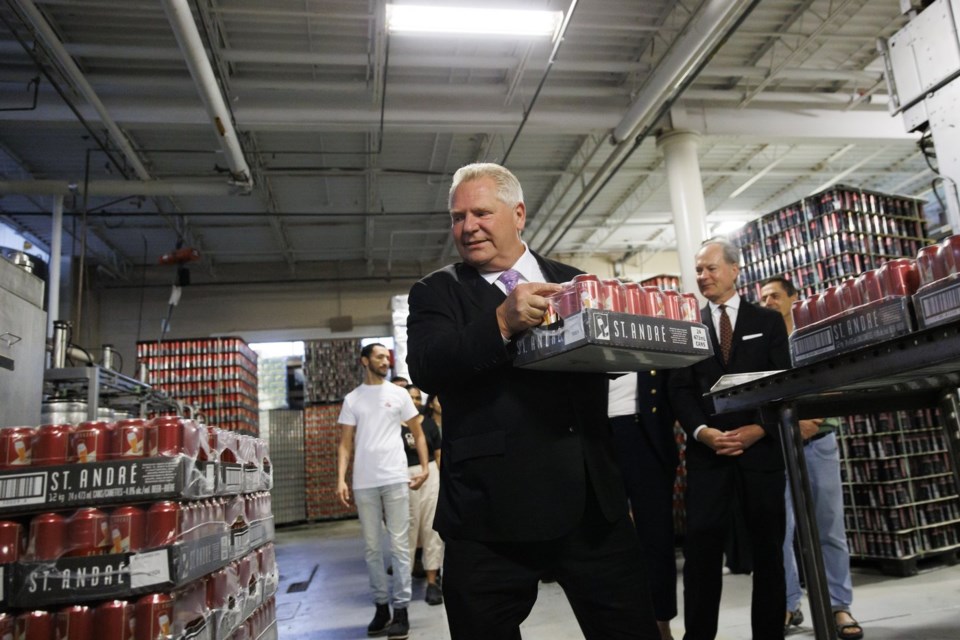TORONTO — Ontario will not budge on its plan to have ready-to-drink cocktails sold at convenience and grocery stores across the province, Premier Doug Ford said Wednesday on the issue that has become a sticking point in an ongoing strike by liquor store workers.
Workers at the Liquor Control Board of Ontario went on strike last week, an action their union says is about Ford's plans to expand alcohol sales, rather than wages.
Grocery stores that already sell beer and wine will be able to sell ready-to-drink cocktails starting Aug. 1, and convenience stores can start selling beer, wine, cider and ready-to-drink cocktails, also called RTD, on Sept. 5.
"RTD is off the table," Ford said. "Let me be very clear: it's done, it's gone, that ship has sailed and it's halfway across Lake Ontario."
Previous rounds of alcohol market expansion in Ontario have kept sales of spirits in the hands of the LCBO.
The Ontario Public Service Employees Union, representing LCBO workers, believes that the next step in alcohol expansion will threaten workers' jobs and the LCBO's existence.
"We’re on strike because we are fighting for the very future of the LCBO and the public revenues it generates," said Colleen MacLeod, chair of the union’s LCBO bargaining unit.
Ford urged OPSEU to get back to bargaining.
"The quicker we get back to the table, the quicker we're going to be able to move forward with those three issues: benefits, salaries and job security," he said.
No talks are planned, the union said. They are waiting for the mediator to call them back to the table.
MacLeod said the union was "thrilled" to hear Ford wanted them back at the table with the LCBO.
"Doug Ford is welcome to join those talks," MacLeod said.
The LCBO said it did not want a strike and remains committed to reaching a deal.
"The most constructive thing OPSEU could do is respond to the offer we tabled last week," the LCBO said in a statement.
The union has stepped up its actions during the strike by picketing LCBO warehouses and distribution centres, significantly slowing down delivery trucks arriving to stock up.
The LCBO brings in a net income of $2.5 billion to the public's coffers annually, which is then used by the province on services such as health care and education.
Ford released a video earlier this week with a map the province created to show the locations of other spots that sell alcohol, aside from the LCBO.
He insisted Wednesday he was not directly involved with negotiations, but also said he has spoken to "hundreds" of LCBO workers and told them about the deal on the table.
He claimed front-line LCBO workers had not "even seen" the LCBO's latest offer that came last week.
"Go on the LCBO website, if you haven't see the deal, pull it up, and if you think it's fair then tell your OPSEU leadership," he said.
The LCBO's latest proposal, which it said was tabled the day before the strike, includes wage increases of 2.5 per cent in the first two years of the deal and two per cent in the third year, as well as a special adjustment for certain warehouse positions.
The proposal would convert about 400 casual workers to permanent full time, improve access to benefits for casual part-timers, expand shift ranges for retail permanent full-timers, and improve severance provisions.
The union said the strike is about job protection.
"Doug Ford's alcohol everywhere scheme will mean thousands of lost jobs, fewer hours for the 70 per cent of LCBO retail workers who are casual and struggling to make ends meet, and hundreds of millions in dollars of lost public revenues drained from health care, education, and infrastructure," MacLeod said.
This report by The Canadian Press was first published July 10, 2024.
Liam Casey and Allison Jones, The Canadian Press



